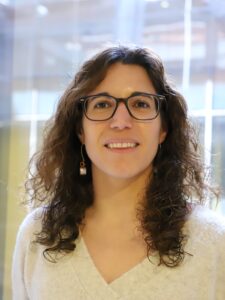The NF2 Accelerator Initiative funds a variety of research projects to bring NF2 treatments to the clinic and to patients. We asked one of these researchers, Elisabeth Castellanos Perez (Fundació Institut d’Investigació en Ciències de la Salut Germans Trias i Pujol in Spain), to tell us more about her work and how she ended up in the NF field.
CTF: What are you hoping to learn from this project?
Dr. Perez: In the laboratory we performed a proof-of-concept on this type of therapy based in antisense oligonucleotides in a primary fibroblast from an NF2 patient harboring a deep intronic variant, which proved to be promising. This project will allow us to test the therapy on more patient samples and verify that we can repair NF2 splicing mutations, both at deep intronic locations and in canonical sites. Moreover, it will also allow us to study whether if it is possible to use this treatment to reverse aggressive phenotypes produced by truncating mutations into less severe forms in vitro.
What are you looking to achieve?
We want to demonstrate that PMOs are a potential therapy in vitro. Once we have the proof that is possible to revert the mutation in patients’ fibroblasts though this project, the next step would be to test its effectiveness in the target cells of the disease. We are aware that we need to overcome some limitations as these cells are not easy to maintain in culture and these samples are difficult to obtain as they come from a tumor that must have been surgically operated. Thus, we are developing iPSCs derived tumor models in order to be able to test this therapy in schwannoma and meningioma iPSCs-derived models. Finally, we would like to test this therapy in vivo using the available or new animal models for NF2 and further in clinical trials.
Our long-term main goal is to understand why NF2 related tumors develop, design effective genetic therapies and open news opportunities in the field of personalized medicine for the NF2.
What does it mean to you to receive this funding from CTF?
This grant represents a great opportunity for our emerging NF2 translational research group to keep growing and improving in the NF2 research. Furthermore, it is a recognition to all the previous work done, taking into account not only our efforts to do research but also in the clinical genetic diagnosis. This funding allows us to focus on our main interest that is to find potential therapies for the NF2 patients.
What brought you to the NF research field?
In 2009 I enrolled in the Germans Trias & Pujol Institute (IGTP, Badalona, Barcelona) to be in charge of the genetic diagnostics activity of the Hereditary Cancer Program, specially neurofibromatosis. In 2010, Dr. Francesc Roca-Ribas, an otorhinolaryngologist at Germans Trias & Pujol University Hospital (HUGTiP) and Dr. Blanco, genetic counselor at the same hospital, started the NF2 Multidisciplinary Unit and I enrolled as a geneticist and a researcher. Since then, thanks to the participation of other specialists and the enthusiasm of all of us, we manage to transform this NF2 centered unit to the HUGTiP-IGTP-ICO Spanish Reference Center (CSUR) on Phakomatosis focused on the clinical management of Neurofibromatosis, Tuberous sclerosis and related disorders, join the GENTURIS (European Reference Network of rare genetic tumor risk syndromes) and be recognized as a consolidated group by Generalitat de Cataluña (SGR2018). This is a very enriching environment where I am learning the different problems the patients present and the difficulties clinicians have to manage them in the biweekly clinical meetings on NF.
At the same time, I was member of Dr. Serra’s lab, which is centered mainly in the study of NF1 associated tumors. During these years, and due to the passion and enthusiasm with which both NF clinicians and researchers study NF, such as Dr. Serra, Dr. Lázaro and Dr. Blanco, I have been infected by the same interest, and I focused mainly in the development of new diagnostic tools based in NGS and other genomic techniques, and in a translational research activity centered in solving the problems we detected in NF field.
What do you like to do when you’re not in the lab?
I am a very active person, and I am currently completing a Master’s Degree in Bioinformatics and Biostatistics and I am collaborating in volunteer work at my children’s school. Also, when I have time, I really like going for a run or going to the gym, spending time playing with my kids, hiking in the mountains or dining at a special restaurant.
To learn more about the NF2 Accelerator Initiative, Dr. Perez’s project, and another NF2 drug discovery project from Dr. Vijaya Ramesh, click here.

